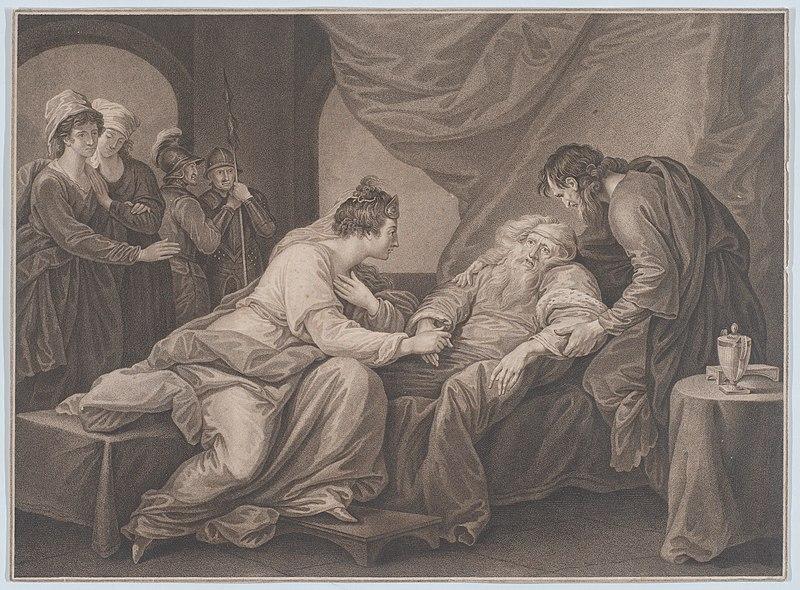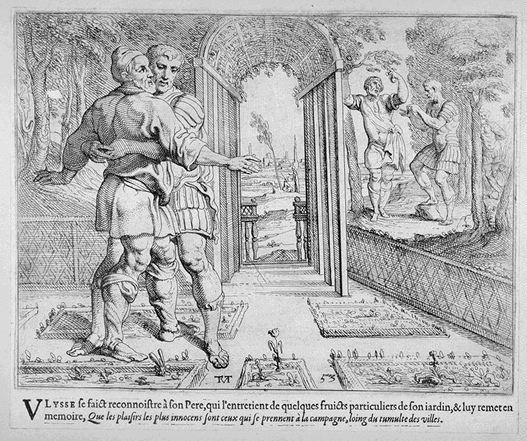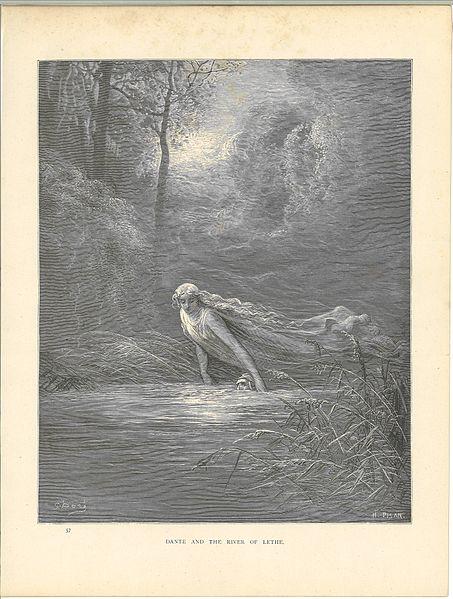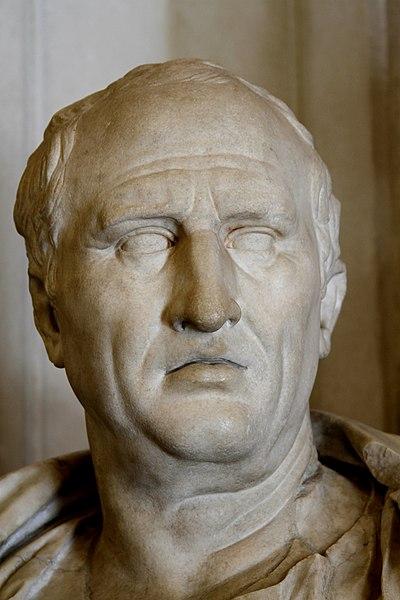Fears surrounding Cognitive Decline
Fears involving cognitive decline are not exclusive to Alzheimer's Disease, however this disease is typically implicated within this discussion since it is one of the most common leading causes. This section of the exhibit compares historical and current fears surrounding cognitive decline; the occurence of these fears is viewed in the light that it is very normal and natural to fear personal change. However, the overall intention of page is to try and work through some fears individuals may still have in the modern day, while also explaining that even after a person experiences cognitive decline, they are still themselves. Having healthy, controlled discussions, personally and publicly, about specific fears is an important aspect to healthy, societal interactions as well as a great way to help reduce stigma that may stem from fear.
Societal fears regarding cognitive decline have been sited throughout recorded history within multiple mediums and across cultures. Through speeches, declarations, novels, oral stories/traditions, plays, and visual artworks, individuals have displayed their general and specific fears regarding what it may be like to experience cognitive decline. This general fear was so instilled within society, that most individuals believed until a few decades ago that aging always brought about dementia. For instance, the Shakespeare play, King Lear, revolves around many topics pertinent to life at the time. The aging King Lear is seen progressing into an almost constant confused state, while also struggling with daily-life tasks and remembering those closest to him. Though it is impossible to blatantly say that King Lear had Alzheimer's Disease, he definitely displayed many symptoms of it as well as general age-related cognitive and physical decline. In this engraving, Cordelia is seen speaking with King Lear, trying to remind him who she and his son are; at this point in the story, the king has become bedridden, as it is unsafe/he is unable to move around and operate as he once did. However, it is important to note, King Lear would have spells where his memory and majority of skills returned, similar to how actual cognitive decline occurs. Shakespeare's characterization of King Lear was very neutral and revolved mainly within the storyline he created; however, this is a very unique example as for the time, decline was typically viewed very negatively.
(Shakespeare, King Lear).
The Greek storyteller, Homer, has multiple examples of age-related cognitive and physical decline within his Epics' vast character lists; the character who may be the most notable example of someone with probable Alzheimer's Disease is Laertes from, The Odyssey. Laertes is the main character's, Odysseus, father who has a much bigger role within the later part of the poem. When Odysseus returns from his journey, he meets with Laertes who has aged considerably since the last time they saw each other. Odysseus notices that he must help Laertes move around, as depicted in the engraving showcased; Laertes is still able to move, however he has trouble with coordination and remembering where he meant to go. It is also heavily noted that Laertes' memory has become very poor in multiple aspects; for instance, he cannot remember or name multiple individuals he was extremely close with and meaningful events that occurred. However, though Laertes has gone through numerous changes, as had Odysseus, Homer makes it clear that there are multiple aspects of his personality, identity, and how he carries things out, just as he had previously. Though it is impossible to say that this character had definite Alzheimer's Disease, it is very likely that this was Homer's portrayal of typical age-related cognitive decline he saw within his time and country. This classic literature example of probable dementia is another great example of how to operate around natural fears in a healthy and constructive way. Odysseus is very shaken by the changes he saw in Laertes, among confusion as to why it was occurring, however this didn't stop him from speaking directly to Laertes about the situation. Further, Odysseus aided Laertes in ways that he needed, however he didn't coddle him and continued to respect him as an individual.
(Homer, The Odyssey).
Up until the modern day, the term "senile" and/or "senile dementia" was commonly used to colloquially describe, and even a "diagnosis" for, age-related cognitive decline, that could be also describe comorbidity with physical decline. Not only were these terms based on ignorance and ablism, but they also carried a general belief/fear that if every single individual lived long enough, then they would experience dementia. This theory, however, has long since been mostly cast aside (scientifically at least) as there is overwhelming evidence that it is untrue. However, even before terms like senile arose, the idea of age-related cognitive decline became well documented within various cultures all throughout recorded history. This idea was typically called many different things across different areas of the world, but one of the most used terms roughly translates to "the forgetfulness" or "the wandering." Though each term may hold slight variations in meaning, the overall indication of these terms is that if an individual is described as showing signs of this, in today's terms, they most likely were experiencing symptoms of age-related cognitive decline. One example of this comes from, The Divine Comedy, a poem by Dante Alighieri written in the early 1300's. In an emotional part of the tale, Dante had to interact with the River Lethe, a mythological river noted as causing "the forgetfulness." In some translations of the story, all mortals must cross this at some point before they die if they live long enough, yet in other translations only some individuals cross it. Within Dante's case though, as the engraving portrays, he is almost fully submerged within the river and is spared from the true power the river holds. This poem's view of "the forgetting" is negative, however just simply from a point of fear towards being afflicted, not towards those who encounter it. This may highlight a different side to the customary idea within this time period that it was most favorable to die within battle, while one is within their prime, instead of aging.
(Berchtold, et al., 1998; Dante Alighieri, The Divine Comdey.)
Thoughts and interpretations regarding aging and why certain decline(s) may occur have been main questions within philosophy for thousands of years. Though questions of this nature are typically more direct in today's world because of the mass amounts of information and research gathered throughout the centuries, they are still very similar to what individuals have always been wondering. For instance, Cicero, an Italian philosopher within 100 B.C. has been credited with a multitude of ideas and line of questions regarding aging and how the process works. One of Cicero's most famous works, De Senectute, translated as "On Old Age", poses numerous questions and ideas surrounding the topic. This work is also a great example of why it is great to talk about and face fears that one may have in a healthy manner. Cicero writes how he began this line of philosophy out of fear and frustration of what old age may bring to him, however through his studies and thoughts, he came to not have any fear or anger towards the topic. Cicero and his correspondent concluded that it's much easier to age if one has more resources compared to the average man. Interestingly, Cicero clearly states multiple times that memory must surely decay at least somewhat if one reaches quite an old age; however, he also states that it seems as if doing mentally stimulating tasks will help with memory retention throughout aging. Though Cicero made all of these postulations with very limited knowledge compared to today, some of his theories are very similar to what is currently believed in science today. However, it must be noted that even though Cicero had many great points, still valid to modern day discussion, he also had many that in today's time are incredibly stigmatizing and blatantly incorrect. Therefore, it is advised that viewers use discretion for full viewing of "On Old Age," as it could be upsetting.
(Cicero, On Old Age.)



